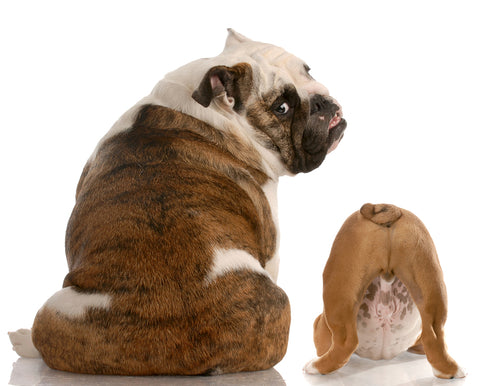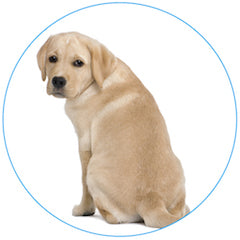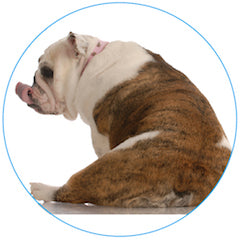What Causes Anal Gland Problems in Dogs?
 This question comes up often. Why is my dog having anal gland problems? People also want to know what they can do to prevent it. In order to understand how to prevent anal gland problems it is important to understand the first question of what causes anal gland problems.
This question comes up often. Why is my dog having anal gland problems? People also want to know what they can do to prevent it. In order to understand how to prevent anal gland problems it is important to understand the first question of what causes anal gland problems.
Causes of Anal Gland Problems in Dogs & Cats
Understanding why your pet is having anal gland problems is important to getting on the path to controlling or resolving the problem. For many pets there can be one or multiple factors contributing to their anal gland issues. Here are some of the most common reasons:
Digestive Problems - The normal process whereby your pet empties their anal glands is during normal defecation. The pressure from the stool as well as contracting of the muscles forcefully causes the anal glands to empty. This normally leaves a small amount of scent marking fluid that other dogs identify one another by. If your pet has diarrhea, soft stools, or smaller stools then they will have difficulty emptying their anal glands normally. This can lead to the glands filling up excessively or not emptying properly that can further lead to discomfort, infections, and/or anal gland abscesses.
It is therefore important to resolve any underlying gastro-intestinal problems that your pet may be having. This would need to be addressed with your veterinarian as the underlying problem can be simple or serious. For many pets simply improving the quality of the diet can have very positive results on anal gland health. Beyond that, adding Glandex to your pet's daily diet will help to support a healthy digestive tract and help to create large firm stools to naturally empty the anal glands. That's because Glandex contains the precise amount of fiber to support healthy digestion and anal gland health, as well as probiotics and digestive enzymes to further support the digestive tract.
Allergies - Like people, many pets suffer from allergies which can contribute to many secondary problems including anal gland problems. Allergies in dogs can manifest as inflamed and itchy skin. This can affect many different parts of the body including the ears, feet, and belly but it can also affect the perianal region (the area around the anus) including the area of the anal glands. For this reason it is important to discuss your pet's allergies with your veterinarian. Once the underlying causes of the allergy is identified they can be avoided. Broad categories of potential allergens in pets include outdoor allergies, indoor allergies, food allergies, and flea bite allergies. Glandex is formulated with natural anti-inflammatories that help to target underlying inflammation and allergies.
Anatomy - We are all born with different anatomy which is what makes all pets and people different. Anatomy determines the size and location of our body parts. For some dogs, their anal glands can be located in a less than ideal location, making it difficult to empty on their own. There tends to be a general trend that smaller breed dogs have more anal gland related problems than larger breed dogs and this can be related to their anatomy.
Obesity - Obesity can lead to a dog's anal glands being located too far internally to empty properly and can result in similar problems as a dog with poor anatomy. Furthermore, obese pets may lack the muscle tone that helps to forcefully contract around the anal glands to empty them. For obese pets with anal gland problems, exercise and weight loss are key components to improving anal gland health.
Manual Irritation - Although it is sometimes absolutely necessary to have the anal glands emptied manually, it is not something that should be done excessively or "just because". The manual process of emptying the anal glands can cause further irritation to the glands especially in a smaller dog. Ideally the anal glands should empty naturally on their own every time your pet defecates. Emptying the anal glands repeatedly is similar to constantly picking at a red and inflamed pimple. It tends to further exacerbate the redness and inflammation and makes the problem worse, not better. Similarly the anal glands should be manually emptied only when necessary and indicated. Your veterinarian will be the one to determine if emptying the anal glands is needed but typically this is when they are overfilled, blocked, or cannot empty on their own.
Other Causes - In addition to the problems mentioned above there can be other less common causes of anal gland problems. These would include a tumor of the glands or surrounding area including some types of cancer. Although intestinal parasites don't directly result in anal gland problems they can lead to similar symptoms and also affect the digestive health of your dog, thereby leading to anal gland problems.
As you can see there can be many causes for anal gland problems in dogs. For some dogs there may be a combination of factors leading to their anal gland problems. It is once again important to discuss these causes with your veterinarian to better treat and resolve your dog's anal gland problems. Fortunately Glandex is formulated to specifically address all of the underlying causes of anal gland problems and is recommended by veterinarians for healthy anal glands.
Dr. James Bascharon, D.V.M.
This article is for informational purposes only and is not intended as medical advice or to replace proper medical attention. If your dog is experiencing anal gland problems or any other health issues you should seek a medical exam from your veterinarian.
Get in on the conversation! Post your questions or comments below. Our staff veterinarian will review your question and respond back to you.




